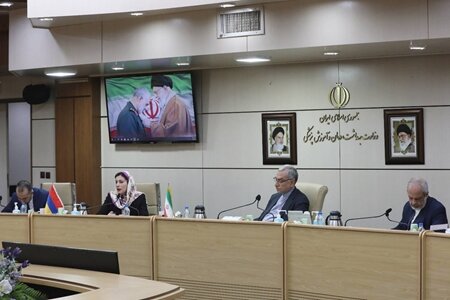Tehran, Yerevan to form joint working group on health

TEHRAN – Iran and Armenia will set up a joint working group with the aim of boosting relations in the health sector.
In a meeting in Tehran, Iranian Health Minister Bahram Einollahi and Armenian Health Minister Anahit Avanesyan discussed ways to expand ties in areas related to health.
On the sidelines of the meeting that was held on January 22, Einollahi said relations between Iran and Armenia have a long cultural and historical background.
In order to develop bilateral relations between the Islamic Republic of Iran and the Republic of Armenia in the field of health, an executive working group consisting of managers and experts from the two countries will be formed to examine the fields of cooperation and prepare the ground, he added.
“Medicine, medical equipment, medical education, and healthcare, especially in the field of health tourism, as well as the exchange of professors and students, are the most important areas of cooperation between the Islamic Republic of Iran and the Republic of Armenia.”
He welcomed a proposal made by the Armenian official to launch an exhibition of Iran's achievements in medicine, medical equipment, and medical sciences in Armenia.
Avanesyan, for her part, while emphasizing the need for the development of cooperation between the Islamic Republic of Iran and the Republic of Armenia in the field of health, said Armenia welcomes holding Iranian exhibitions in the field of health.
In January last year, the Iranian Ambassador to Armenia, Abbas Badakhshan Zohouri, met with Avanesyan to discuss cooperation in the health sector.
Pointing to the importance of promoting mutual understanding between the two countries, especially the existing capabilities in the production of medicine and medical equipment, Zohouri highlighted expanding bilateral partnership in the field of health and treatment, ISNA reported.
“The big potential of the Armenian-Iranian partnership in pharmaceutics is obvious. We constantly consider the opportunities to mutually engage the Iranian-made medicine into the Armenian market,” Avanesyan said.
Investment programs, development of healthcare tourism and regional cooperation in the health sector, educational programs, and exchange of experience were discussed during the meeting.
On the sidelines of the Shanghai Cooperation Organization (SCO) which was held in Uzbekistan on September 15-16, 2022, President Ebrahim Raisi signed an agreement with the countries of the Caspian Sea region, according to which the member countries will cooperate with each other in the field of health.
One of the successful aspects of health diplomacy in the region is this cooperation, he said, adding, "We are looking to implement this program in the region as in European countries to facilitate the exchange of students and professors, and to facilitate their participation in international conferences."
Four countries, including Armenia, signed memorandums of understanding, announcing their readiness for buying Iranian-made medical equipment at the 4th National and the 15th International Reverse Expo, which was held in Tehran on December 10-13, 2022.
Representatives from Uzbekistan, Armenia, Turkey, and Bosnia signed 40 memorandums of understanding with Iranian knowledge-based companies during the 3-day event.
In June 2021, Ahmed al-Mandhari, the World Health Organization director for Eastern Mediterranean Region, said the Islamic Republic of Iran is a role model for primary health care.
For the past four decades, its PHC network has aimed to ensure that people have timely access to affordable, accessible, and acceptable essential health services, he explained.
The national budget bill for the next Iranian calendar year 1402, which starts on March 21, has increased the health sector’s budget by 29 percent compared to the current year’s budget.
The bill has proposed a budget of 2,730 trillion rials (about $6.8 billion) for the Ministry of Health.
MG
